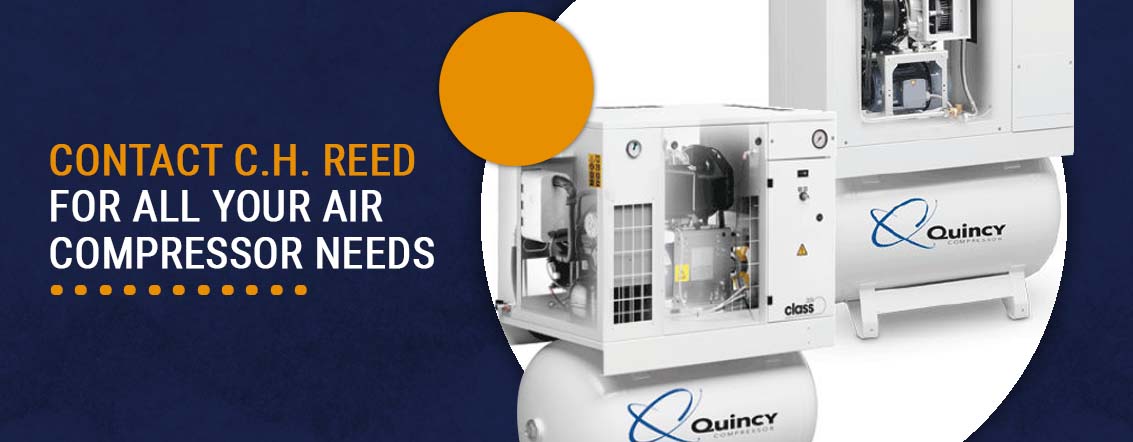July 11, 2023
Oil-Free Air Compressor Applications
SHARE THIS POST
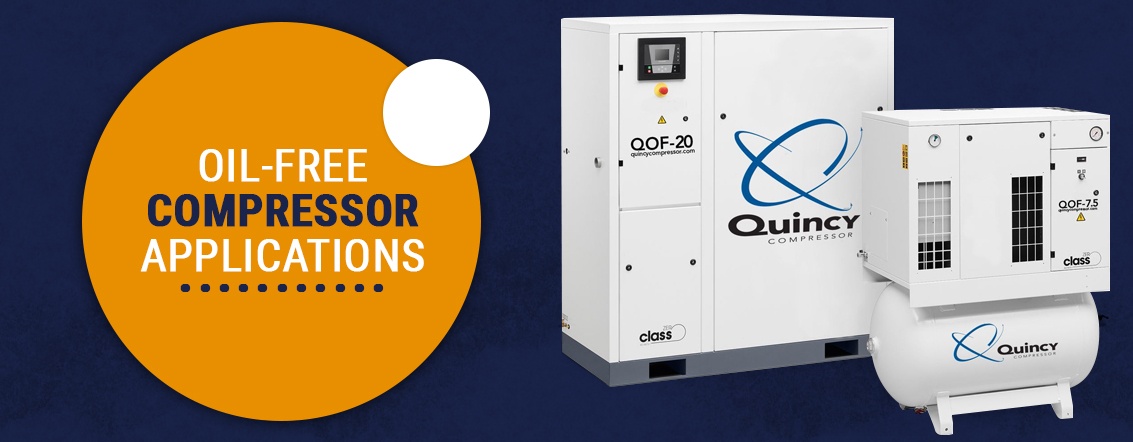
In a variety of different industries, air compressors act as workhorses to power tools and machinery to get jobs done safely, effectively and efficiently. According to the U.S. Environmental Protection Agency, 70 percent of manufacturing facilities use a substantial amount of compressed air during production. But a business’s choice regarding which type of air compressor to purchase is a critical one. For example, many industrial applications call for oil-free air compressors to ensure quality, uncontaminated products, safe processes and much more.
So, what are some common oil-free air compressor applications, and what are the benefits of oil-free compressors for manufacturing and other industries?
Pharmaceutical Manufacturing
Oil-free compressors are essential in pharmaceutical manufacturing. Because pharmaceuticals are intended for human ingestion, they need to be free from contaminants. Untreated compressed air can contain up to 200 million dirt particles, and pharmaceuticals made with oil-lubricated compressors are particularly susceptible to hydrocarbon contamination. So oil-free compressors help maintain a high standard for pharmaceutical-grade products.
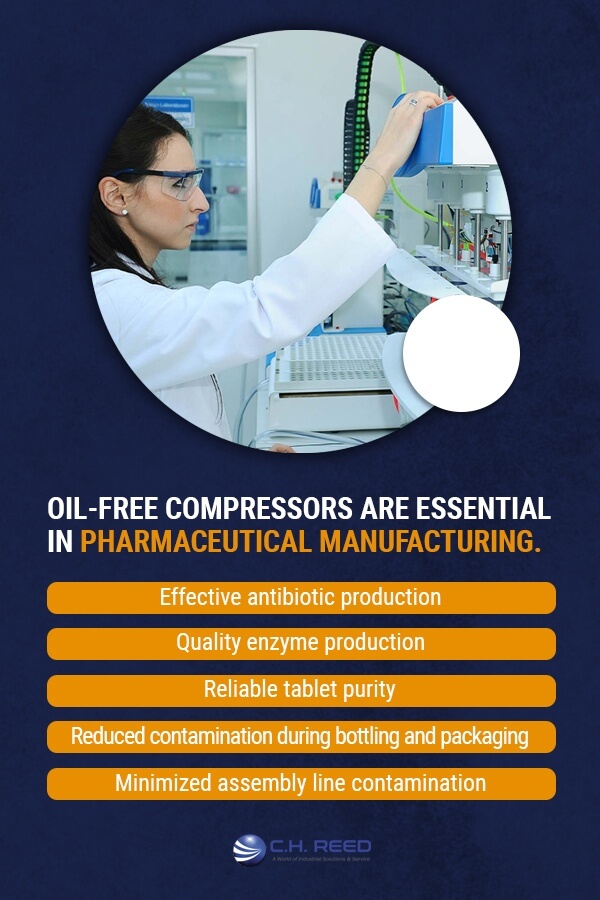
Some of the benefits of oil-free compressors for pharmaceutical manufacturing include:
- Effective antibiotic production: The production of antibiotics requires antibiotic fermentation. Compressors supply compressed air during fermentation — but the introduction of oil into this process, even minuscule amounts of oil, would destroy the bacteria and contaminate the antibiotics. An oil-free compressor prevents the introduction of oil and ensures that a facility can produce high-quality antibiotic products.
- Quality enzyme production: Compressors also supply the oxygen necessary for oxidation in the production of enzyme products, including digestive enzymes such as lactose. Small amounts of oil can wreak havoc on this process as well. An oil-free compressor keeps the enzymes oil-free and ensures the dependable quality of the products.
- Reliable tablet purity: In the production of pharmaceutical tablets, compressed air is involved in spraying on the tablet coatings. A compressor that uses oil lubrication could compromise the quality of the tablets, but an oil-free air compressor ensures that tablets will be free from contamination and safe for patients to consume.
- Reduced contamination during bottling and packaging: Pharmaceutical facilities also use compressed air in making bottles and blister packages that contain pharmaceutical products. An oil-free compressor keeps oil contamination from compromising the packaging and putting consumers’ health at risk.
- Minimized assembly line contamination: Pharmaceutical assembly lines use pneumatic cylinders, valves and other parts that require compressed air. A small amount of oil that dispersed into the air could contaminate the entire production space, but an oil-free compressor helps ensure that the assembly line packages safe and effective pharmaceutical products.
Food and Beverage Manufacturing
Because food and beverages, like pharmaceuticals, are intended for human consumption, they must remain free from contaminants, so they taste good and reduce health risks. An oil-free compressor helps contribute to good public health and overall quality of taste. Here are a few of the specific benefits of oil-free air compressors for food and beverage manufacturing:
- Keeping powders pure: Powdered food and beverage products such as cake mixes, powdered milk, and cocoa powder require compressed air to propel them through pipes during production. If oil gets into the powders, it will alter their flavors, and the oil contamination could also cause adverse health effects. An oil-free compressor helps protect consumers from oil contamination in their powdered foods.
- Improving the quality of fermented products: The manufacture of food products such as citric acid requires fermentation, which requires the addition of oxygen. When oil-lubricated compressors supply that oxygen, they may contaminate the fermented product with oil. Using an oil-free compressor help keeps the quality of fermented food products high.
- Ensuring the safety of preserved foods: Compressed air is useful in preserving foods. During this process, the compressed air breaks down into two separate streams of oxygen and nitrogen. The nitrogen is then used in canned goods, as well as in storage facilities and to stabilize foods for transport, eliminating oxygen, so the food doesn’t spoil easily. The nitrogen makes direct contact with the food, so any oil it was carrying could contaminate the entire product. An oil-free compressed air helps ensure preserved foods are safe and contaminant-free.
- Creating fresh, safe baked goods: Compressed air is also useful for cooling down baked goods after they have been in the oven. A quick spray with compressed air helps get the products ready for packaging. Spraying bakery products with oil-contaminated compressed air could ruin the product and make them unsafe to eat, but an oil-free air compressor helps produce safe, tasty desserts.
Automotive
Compressed air has a number of different uses in the automotive industry — both in tier 1, which supplies automotive-grade parts directly to equipment manufacturers, and tier 2, which may supply non-automotive-grade parts, like computer chips, indirectly. Below are some of the benefits of oil-free air compressors for automotive manufacturing:
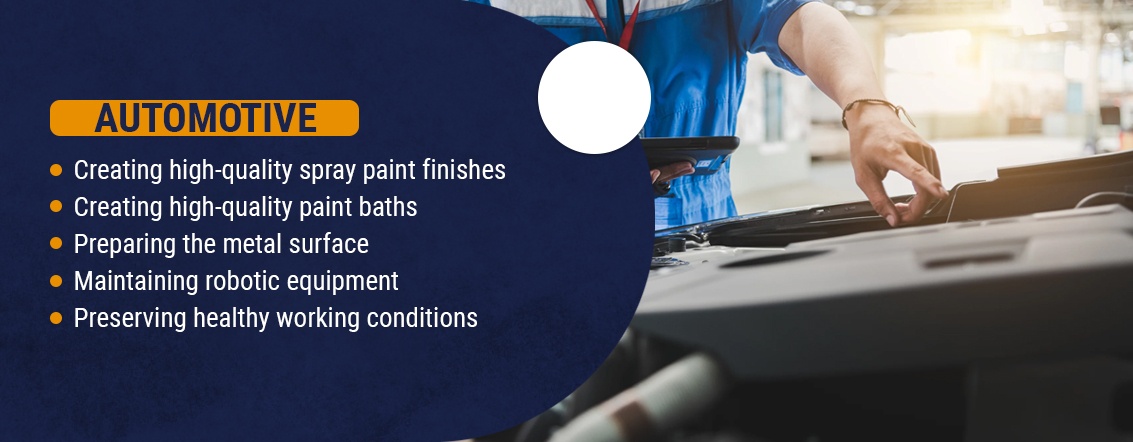
- Creating high-quality spray paint finishes: The automotive industry uses compressed air as a propellant for spray paint finishes for vehicle bodies. If the spray paint became contaminated with residual oil from the air compressor, the paint could bead and blister, or it might fail to adhere to the metal. An oil-free compressor helps give the paint a smoother consistency and better adhesive properties for the ultimate in aesthetic appeal.
- Creating high-quality paint baths: Another option for putting the finish on a vehicle is to give it a paint bath. Compressed air mixes the paint to prevent areas of cohesion and give it an even consistency. Residual oil from the air compressor could spoil the paint, giving it a lumpy consistency and preventing it from sticking to the metal. But an oil-free air compressor helps give a car or truck a brilliant, smooth shine.
- Preparing the metal surface: Before painting begins, the automotive facility must wash the metal and then use compressed air to dry it. If any dirt or oil remained on the surface after drying, it could compromise the paint job. But using an oil-free air compressor keeps oil off the vehicle body’s surface and ensures proper adhesion of the paint.
- Maintaining robotic equipment: Many automotive facilities use sophisticated robots to do much of their assembly work. These robots are sensitive to the presence of oil in the air, which can gum them up, impede their function and lead to costly repairs and replacements. An oil-free compressor helps automotive facilities keep their robotic equipment in optimal condition.
- Preserving healthy working conditions: The many pneumatic tools of an automotive shop spray large volumes of compressed air. If that compressed air contains oil, employees could breathe it in and harm their lungs. Using an oil-free compressor helps ensure a safe, hazard-free working environment.
Universities and Hospitals
In university and hospital settings, oil-free air compressors are essential, especially for laboratories. Below are some of the benefits of oil-free compressors for hospitals and universities:
- Ensuring a pristine environment: The small amounts of oil from an oil-lubricated compressor could present a health hazard to patients and contaminate sensitive lab samples. An oil-free compressor keeps the hospital setting clean and safe, and it helps ensure the quality of lab samples and results.
- Laboratory applications: Hospital and university laboratory applications that use testing equipment such as mass spectrometers, chromatography, spectroscopes, and a multitude of other analyzers require clean oil-free air. Additionally, clean rooms and blow-off applications in labs cannot have any oil contamination in the lines.
- Reducing wastewater: With an oil-lubricated compressor, hospitals and university laboratories must find a way to dispose of oily waste, which can contaminate the environment. An oil-free compressor gives hospitals and university labs the peace of mind of knowing they are doing their part to keep the environment clean.
- Preserving mechanical systems: As with equipment in other industries like the automotive industry, medical equipment is sensitive to corrosion and oil buildup. A buildup of dispersed oil from an oil-lubricated compressor may make the joints of laboratory equipment difficult to move and necessitate costly repairs and replacements. An oil-free compressor eliminates these issues and keeps expensive lab equipment working effectively.
- Improving air quality: Even when compressor oil does not present a specific hazard, it may still lower the air quality in a university lab or hospital environment. Especially in a hospital, where patients may be ill or recovering from surgery, providing the best possible air quality is essential to promote healing and health. An oil-free air compressor helps ensure excellent air quality for hospital patients, laboratory workers, university students and faculty.
Electronic Product Manufacturing
Oil-free compressors provide several benefits to electronic product manufacturing as well. Below are some of the benefits of oil-free compressors for electronic product manufacturing:
- Ensuring pristine production conditions: Sparking clean conditions are essential for the production of sensitive, intricate electronic products. Oil dispersed into the air from an oil-lubricated compressor can easily coat electronic parts and cause them to malfunction. It can also disrupt precision processes such as picking, drilling and situating electronic components. An oil-free compressor eliminates this risk and helps ensure the unmatched quality of electronic products.
- Maintaining production equipment: Oil from an oil-lubricated compressor can also easily jam control valves and actuators in the equipment used to assemble electronic products. An oil-free compressor keeps equipment parts functioning smoothly and helps make the need for maintenance and replacements less frequent.
- Protecting production quality: In electronic product manufacturing, compressed air is often used to separate nitrogen, which is an inert gas and essential to prevent metal conductors from oxidizing during soldering or wire bonding. Oil from an oil-lubricated compressor can contaminate the nitrogen and diffuse this protective property. It can also collect on the hot metal components and lead to short-circuiting. Using an oil-free compressor helps ensure these production processes run effectively and without contamination.
- Ensuring correct assembly: Compressed air is necessary for the assembly of components such as wafers, PCBs and memory chips. Oil from oil-lubricated compressors contaminates the components and interferes with processes such as drilling, wire bonding, molding, spraying, cutting and die attachment. Using an oil-free compressor eliminates these issues and helps ensure the accurate assembly of electronic products.
Gas Separation
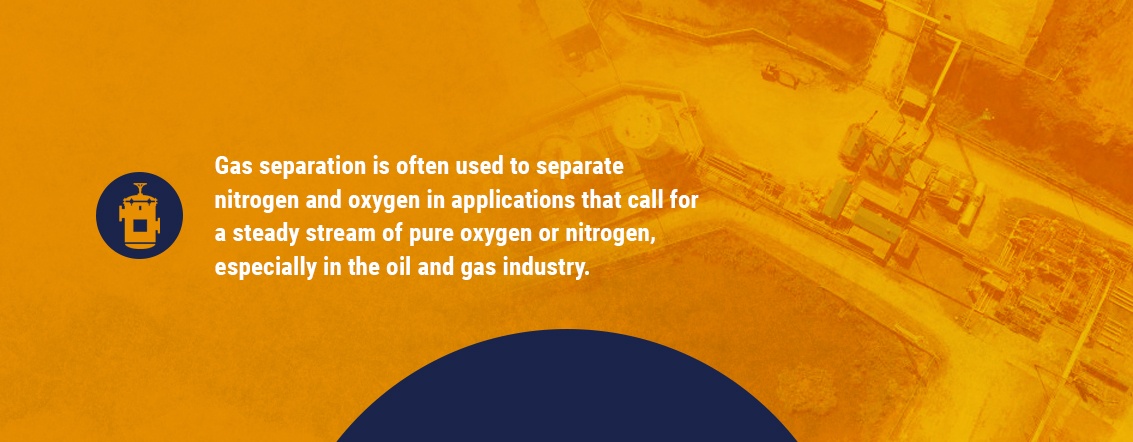
Gas separation is often used to separate nitrogen and oxygen in applications that call for a steady stream of pure oxygen or nitrogen, especially in the oil and gas industry. Industries that require gas separation seem to be shifting to oil-flooded air compressors, which are risky for carbon molecular sieve and membrane generators. Below are some of the benefits of oil-free compressors for gas separation:
- Increasing membrane lifespans: Using membrane technology to create a nitrogen blanket is critical for use in various applications for liquefied natural gas (LNG) tankers and natural gas transfer stations. These membranes work by allowing oxygen to pass through faster than nitrogen, leaving an accumulation of oxygen behind. The oil from an oil-lubricated compressor could degrade the membrane and shorten its lifespan, but an oil-free air compressor keeps membranes functioning at peak effectiveness much longer. Secondly, there is a risk of damaging the carbon molecular sieve (CMS) for pressure swing adsorption (PSA) generators. Membrane dryers are generally only used in smaller applications, and/or where the purity requirement is less than 99.5%. All others are generally PSA applications, which is much more prevalent in industrial applications.
- Increasing safety and security: In the field of natural gas, it’s critical to minimize the risks of explosions, fires, and carbon monoxide poisoning. Dispersed oil from an oil-lubricated compressor could increase the chances of these hazards, but using an oil-free compressor decreases the likelihood of hazardous events and helps keep workers safe.
- Streamlining operations: Compressed air is necessary for many natural gas processes, including sulfur removal, instrument and safety valve testing, liquid and gas analysis and more. Dispersed air from an oil-lubricated compressor could contaminate the gas, clog equipment and lead to malfunctions. Using an oil-free compressor keeps equipment functioning properly and streamlines industrial processes.
Chemical Manufacturing
Oil-free air compressors also help improve chemical manufacturing processes. Below are some of the benefits of oil-free compressors for chemical manufacturing:
- Enhancing fermentation and aeration: In chemical manufacturing, compressed air supplies oxygen for the fermentation that creates substances such as citric acid, as well as the aeration that allows chemicals to be oxidized. Oil could kill the bacteria necessary for fermentation and disrupt aeration, but the use of an oil-free compressor allows these processes to proceed effectively.
- Ensuring chemical purity: Even small amounts of oil could contaminate the products and interfere with their chemical properties. An oil-free compressor minimizes the risk of contamination and helps keep the quality of the manufactured chemicals high.
- Increasing safety and security: In chemical manufacturing, as in other industries, taking measures to ensure employee and consumer safety is critical. Contaminated chemicals could cause explosions and burns, but using an oil-free compressor helps ensure the safety of the chemicals that employees and consumers handle.
Glass Manufacturing
Oil-free compressors are essential for glass manufacturing plants as well. Below are some of the benefits of oil-free compressors for glass manufacturing:
- Creating uniform glass surfaces: Compressed air is necessary to help power the machinery that turns sand into smooth, compressed sheets of glass, and it is also used to help rid the molten glass of unsightly bubbles. But oil from an oil-lubricated compressor can create imperfections in the glass surface instead. Using an oil-free compressor helps keep the quality, utility and aesthetic appeal of the glass high.
- Protecting consumers: Apart from creating visible flaws, imperfections can also lead the glass to crack and shatter more easily. Using an oil-free compressor reduces the likelihood of imperfections and allows manufacturers to produce stronger, safer glass sheets and products.
- Reducing equipment malfunctions and maintenance: Intricate compressed-air-powered equipment is necessary for all aspects of glass production, from moving the glass to furnaces to melting the glass, flattening it with liquid tin, cutting it and forming into shapes. Oil could easily clog the equipment, lead to costly delays and require extra maintenance and repairs. But using an oil-free compressor keeps equipment running smoothly and helps lower associated costs.
Contact C.H. Reed for All Your Air Compressor Needs
When you need oil-free compressed air solutions to power the tools and machinery of your industry, your trusted partner is C.H. Reed. With decades of industry experience, we’ve helped thousands of customers reduce their maintenance spend, ensure reliability, and reduce energy costs with their compressed air systems. Our team of factory-trained certified technicians and knowledgeable compressed air specialists can work with you to understand your business, provide insightful ideas to help alleviate pain points in your processes, and meet your facility’s compressed air goals, no matter what they are. If you reside in Pennsylvania, Maryland, Delaware, Virginia, West Virginia, Ohio, or southern New York, contact C.H. Reed for all of your oil-free air compressor applications and needs.
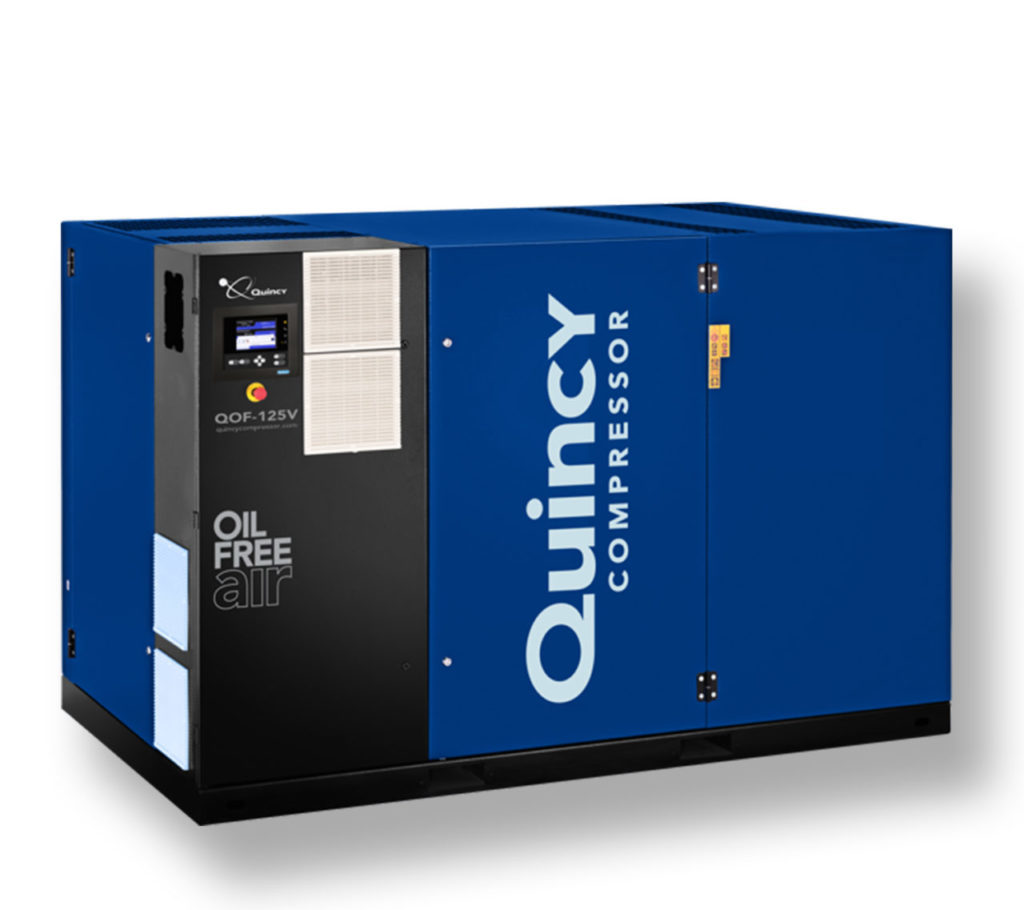
Search
Categories
Get a consultation
Related Posts
The 3 Distinct Advantages of Hydraulic Powered Pumps
Recently, C. H. Reed helped a major printing operation install a new ink pumping system. The new system needed to transfer four colors of high viscosity, heat-set ink to their three presses, drawing the ink from multiple 5,000…
Simple Ways to Reduce Waste in Your Spray Finishing System
In today’s demanding manufacturing landscape, it can be convenient to adopt a “cut-costs-at-all-costs” mentality, justifying questionable means for the sake of leaner production, a lower bottom line and increased profitability. Regrettably, those efforts can interfere…
What You Need to Know About Air-Powered Pressure Washers
Pressure washers are great solutions for your average cleaning applications, but what tool do you turn to for your more challenging applications? There are many instances where it is simply impossible to use a traditional…
